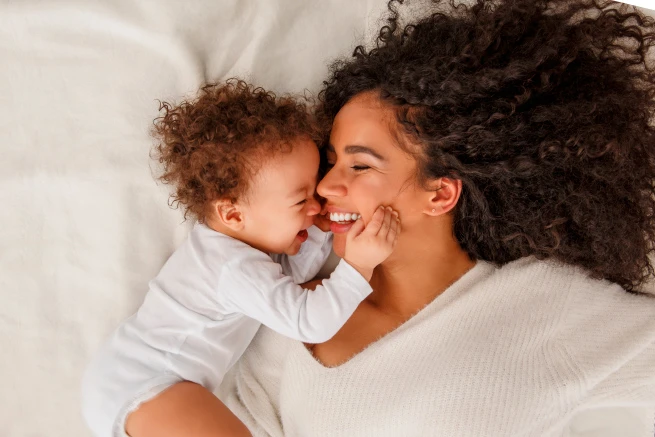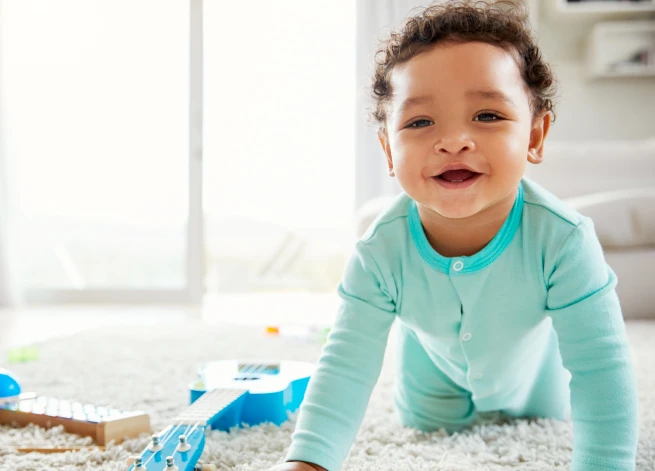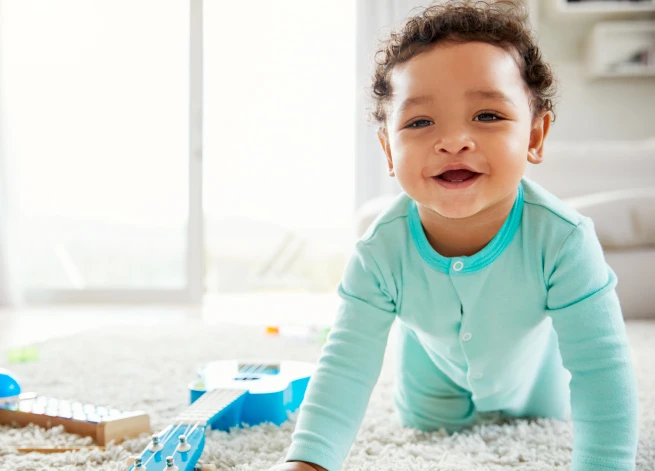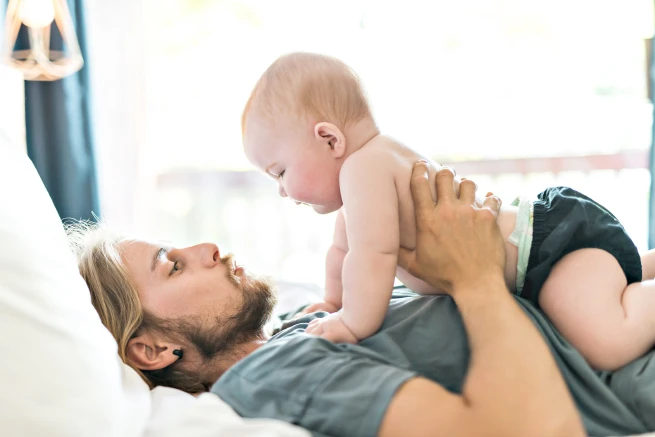Symptoms of chickenpox
The most noticeable symptom of chickenpox is an itchy skin rash with red blisters. The early signs of chickenpox usually appear 10 to 21 days after exposure to the virus, and most people will recover in about one week. Other symptoms of chickenpox that parents should be aware of, and which may appear before or after the rash, include:
A high temperature above 38°C
Feeling unwell – Often aches and pains, mild headache
Loss of appetite
3 stages of chickenpox
The first stage of chickenpox involves bumps or red spots appearing anywhere on the body.
These spots fill with fluid to form blisters, which may or may not spread over the body. These blisters may burst.
The spots may start to scab over as more blisters appear and others scab over.
How infectious is chickenpox?
Chickenpox is very contagious and easy to catch, which is why it’s so common with young children. It can be caught by being in the same room with someone infected by chickenpox, as well as touching clothes or bedding that has the fluid from the blisters on. It’s particularly common to pick up this disease at school, running around and playing with friends as little ones love to do.
Around 9/10 of children in the UK develop chickenpox by age 15. So parents should be on the lookout for any symptoms of chickenpox, so they can provide comfort and care for their child.
When is chickenpox most contagious?
Chickenpox is infectious from one to two days before spots begin to appear up until the blisters are dried and crusted (around five to six days after the start of the rash).
Chickenpox can occur all year around but is most commonly caught in winter and spring, particularly between March and May. In order to prevent the chickenpox infection from spreading, it’s important that parents keep their children off nursery or school until their spots have crusted over. You should also keep them away from public areas, trying to avoid contact with individuals who may not have had the disease, especially newborn babies or pregnant women.
How long does chickenpox last?
Chickenpox usually lasts about one to two weeks before the blisters crust up and fall off naturally. Keep in mind, however, that the rash may be accompanied by other chickenpox symptoms, such as generally feeling unwell and a high temperature.
Can you get chickenpox twice?
Yes, you can get chickenpox again, but this is extremely rare. For most people, they will not develop chickenpox again as they become immune for life. However, others who have had chickenpox may develop a related condition called shingles later in life.
Chickenpox treatment for kids
As chickenpox is a virus, you cannot treat it with antibiotics. It should be noted though that kids tend to scratch and pick at the blisters, which parents should discourage. This can cause bacteria to infect the sores, which may require treatment with antibiotics.
It’s common for children to develop a fever during the early stages of chickenpox. For this, you can give them a paracetamol-based medicine like CALPOL® Infant Suspension. This can help to reduce temperature and get them on their way to feeling better.
There are plenty of guidelines to follow when trying to provide some relief from chickenpox, and there are many ways of trying to help.
What else to do for chickenpox in kids
Give your child paracetamol to help manage the pain and fever, such as CALPOL® Infant Suspension
Keep your child hydrated by ensuring they drink plenty of fluid
Cut your child’s nails and encourage them to put socks on their hands at night to stop them scratching
Dress your child in loose clothes
If your child does keep scratching, speak to a pharmacist about using antihistamine medicine to aid with the itching
Use cooling creams or gels from your pharmacy
If you’re planning to go on holiday, get in touch with your airline first to see if your child can fly with chickenpox
What to avoid when managing chickenpox in babies and children
Do not use ibuprofen unless advised to do so by your GP, as this may result in serious skin infections
Do not give your child aspirin if they’re under 16
Do not let your child come into contact with pregnant women, newborn babies and people with a compromised immune system, as this could pose a danger to their health. Therefore, it’s vital to take your child away from school as soon as symptoms start to emerge.
Chickenpox vaccine
What is the chickenpox vaccine?
There is a chickenpox vaccine which is currently only offered on the NHS to protect people who are at high risk of getting a serious chickenpox infection or passing it onto someone at risk. The vaccine is currently only offered on the NHS to people who are in close contact to people with a weakened immune system who are at high risk of harm from a chickenpox infection and its associated complications. The chickenpox vaccine is also available at certain private or travel clinics for a cost.
Who should have the chickenpox vaccine?
The vaccine is useful for lowering the chances of infecting people at risk. The illness is extremely contagious and can spread very easily. It’s recommended for:
Non-immune healthcare workers
Non-immune people who care for or live around others with a weakened immune system
Who should not have the chickenpox vaccine?
Anyone with a weakened immune system
Pregnant women
Anyone who’s seriously unwell
Anyone who has had a serious allergic reaction (anaphylactic reaction) to a previous dose of the vaccine
Chickenpox immunisation schedule
The vaccine is given as two separate injections, usually into the upper arm, four to eight weeks apart.
Difference between chickenpox and measles
Chickenpox symptoms:
A spotty, itchy rash on the body
Fever – temperature above 38C
Feeling unwell – Often aches and pains, mild headache
Loss of appetite
Measles symptoms:
Fever
Red, blotchy rash which first appears on the forehead
Red, inflamed eyes
Hacking cough and sore throat
Runny nose
Kolpik’s Spots inside the mouth (small red spots with blue-white centres found inside your mouth and cheeks)
You should contact a GP as soon as possible if you suspect that you or your child may have measles.
What does chickenpox look like?

What do measles look like?

When to call the doctor about chickenpox in children
Most cases of chickenpox are mild and will go away on their own. However, it’s important to speak to a GP if:
You are uncertain whether it’s chickenpox
You are concerned about yourself or your child
Make sure to tell the receptionist at the GP if you think it’s chickenpox before going in. They may provide a specific appointment time to reduce the risk to other patients.
Get advice from NHS 111 immediately if:
You or your child’s chickenpox symptoms suddenly get worse
Your child has chickenpox and is showing signs of dehydration, such as fewer wet nappies
The skin around the chickenpox blisters is hot, painful and red, which could be signs of infection
It’s important to get advice immediately from 111 if you suspect your newborn may have chickenpox.
5 tips for looking after your child when they’re infected with chickenpox
To help alleviate chickenpox symptoms in babies and children, you can:
Give your child paracetamol to help reduce pain and fever, such as
Keep your child hydrated by ensuring they drink plenty of fluid
Cut your child’s nails and encourage them to put socks on their hands at night to help prevent scratching
Dress your child in loose clothes
Speak to your pharmacist about cooling creams or gels or antihistamine medicine to help manage
itching



